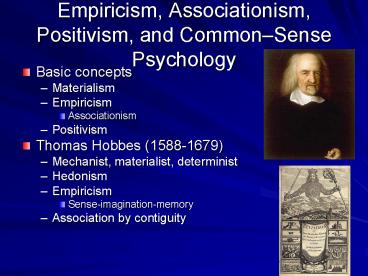Empiricism, Associationism, Positivism, and CommonSense Psychology - PowerPoint PPT Presentation
1 / 11
Title:
Empiricism, Associationism, Positivism, and CommonSense Psychology
Description:
... Associationism, Positivism, and Common Sense Psychology. Basic concepts ... Associating cues to distance and touch. Pupilary convergence. Clarity of the object ... – PowerPoint PPT presentation
Number of Views:1159
Avg rating:3.0/5.0
Title: Empiricism, Associationism, Positivism, and CommonSense Psychology
1
Empiricism, Associationism, Positivism, and
CommonSense Psychology
- Basic concepts
- Materialism
- Empiricism
- Associationism
- Positivism
- Thomas Hobbes (1588-1679)
- Mechanist, materialist, determinist
- Hedonism
- Empiricism
- Sense-imagination-memory
- Association by contiguity
2
John Locke (16321704)
- An Essay Concerning Human Understanding (1690)
- Psychological empiricism
- Ideas from experience
- Sensation
- Reflection
- Simple or complex
- Complex ideas associations of simple ideas
- Primary and secondary qualities
- Knowledge
- Intuitionimmediate comparison
- Reason or demonstrative knowledge
- Comparison by means of a third idea
- Sensation
3
George Berkeley (1685-1753)
- Perception existence, idealism
- No primary and secondary qualities
- Esse est percipi to exist is to be perceived
- God as a perceiver
- Depth perception
- Depth constructed by perceiver
- Associating cues to distance and touch
- Pupilary convergence
- Clarity of the object
- Relative size
- Interposition
4
David Hume (17111776)
- Skepticism
- Reality consistent experience
- Mind perceptions
- Impressions ideas
- Simple complex
- Association
- Resemblance
- Contiguity
- Cause and effect
- Volition
- Habit
- Reality?
5
Empiricism
- Theoretical rationale for psychology
- Man is an animal
- Importance of experience
- Humans simple and knowable
- Influence of Newtondesire to explain the mind
6
British Associationism
- Emphasizing principles and mechanism of
association - David Hartley (17051757)
- Association by simultaneous or successive
contiguity - Sensations/vibrations ideas/vibratiuncles
- Brain and muscular
- Cultureliterature
- Free will
- Deism
7
Utilitarians and Associationists
- Jeremy Bentham (17481832)
- Motivated by pleasure and pain
- Utilitarianismgreatest good for the greatest
number - James Mill (17731836)
- Passive mind
- Atomistic
- Simple and complex sensations and ideas
- Association
- Frequency and vividness
- Not similarity
8
- John Stuart Mill (18061873)
- Science of human nature
- General laws
- Mental chemistry
- Laws of association
- Similarity, frequency, intensity
- Ethologyscience of character
- Alexander Bain (18181903)
- Unite psychology and physiology
- Feeling, volition, intellect
- Associationcontiguity, frequency, similarity
rooted in nervous system - Compound and creative association
- Voluntary behavior and trial and error learning
- Reflexiveelicited versus spontaneousemitted
- Spontaneous associated with pleasure repeated as
voluntary behavior
9
Across the Channel
- Etienne Bonnot de Condillac (17151780)
- Sensation is the source of knowledge
- Mechanistic
- Psychology did not prosper in France
10
Positivism
- August Comte (17981857)
- Positivism
- Observable facts only valid knowledge
- Theological, metaphysical, scientific stages of
development - Ernst Mach (18381916)
- Physicist
- Public, observable with sensory data
- Leads to behaviorism
11
Scottish Common-Sense School
- Reaction against Hume
- Thomas Reid (17101796)
- Minister
- FacultiesGod given active mental powers































